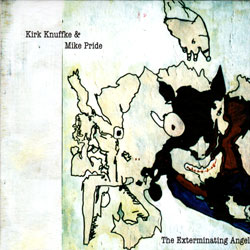
Though he may have since betrayed this quote, King Crimson guitarist Adrian Belew once declared that he didn't need to deviate from the guitar's standard tuning because he hadn't "yet explored everything it has to offer" (this was the mid '90s when guitarist chic demanded a drop of all strings into obscure tunings). While he does color his tone with all manner of effect-stretching, there is something admirable about the embrace of an instrument's idiosyncrasy in the potential sea of technical and musical abyss.
Cornetist Kirk Knuffke and drummer Mike Pride demonstrate a conservative approach to orchestration, meaning they aren't hooked up to amps, or playing underwater, or manipulating anything with feedback, or using special gadgets to coax sounds. And, you know, there are only two people to carry out a complete musical experience. They're confident and trust in the honest power of working through the history of duo jazz music; if you think about that mythology (Monk and Coltrane, Ali and Coltrane) there is a lot to live up to.
However, Knuffke and Pride are effective — not flashy — storytellers, and with their ability to pull you in with calmness and space, they don't require the pyrotechnics often employed as competition with the masters. Though the duo does get busy and work up modest storms, meditative qualities are what you'll take away from The Exterminating Angel. Knuffke opens "Appeasing the Geezer" with a gentle (maybe gentler) purr like Miles Davis' "Sanctuary", almost sighing out his chiaroscuro melody where dots of pauses are imagined and fill in the blanks; really, the whole album nests in a (and this always sounds stupid) "what isn't being played" aesthetic where Knuffke and Pride play just the right amount of music to spur your imagination into hearing "that's where the bass player would be, a pianist would comp the chords here" etc. Pride joins with an equally soft series of wooden taps and drum rolls that emulate a Morse code message (it reads "here I come, let's rally a bit"). There are bits of bowed cymbal, jingling objects on drum heads and out-of-breath, top-of-your-range squeals peppered throughout (i.e. "Goldie", "The Exterminating Angel"), but the music largely floats on time: swing, hard bop and more free rhythms / polyrhythms, with Knuffke and Pride either uniting or refueling while the other stretches out to explore. This template continues with both men playing in the moment (Knuffke mentions in the liner notes that this is his first fully improvised record), showing why their agile, chameleon and balancing approach to style and each other has collectively fit with such disparate characters as Mary Halvorson, John Zorn, Butch Morris, Talibam!, Nels Cline, Nate Wooley, Anthony Braxton and William Parker.
On the 23-minute showcase finale, "SUPERDIXON", the two play off one another, both appearing to be engaged in extended, personal solos that bisect — without tangle — periodically; Knuffke works his lean, composed ascension of pan-harmonic movement while Pride bounces between genres hinged on his ever-present internal pulse (that also keeps the listener toe tapping). At sixteen minutes, the drummer reaches the end of his bag of tricks and opens a new one filled with snatches of Latin-infused triplets, languid Rock, almost-ceremonial Native American traipses and occasional chimes and Chinese gong; near twenty minutes, and the twosome begins to fade out with Pride delicately striking deep tom tones as Knuffke literally seems to walk behind the microphones. It inspires a visual experience where you can picture machines slowly power-down to sleep after a 70-minute voyage.
Per Knuffke, the original formula for the album involved a bass player, but "no one we wanted was available". Who knows how that would have shaped this album, but I can't imagine adding or subtracting from this successful test of musical economy.
Comments and Feedback:
|



